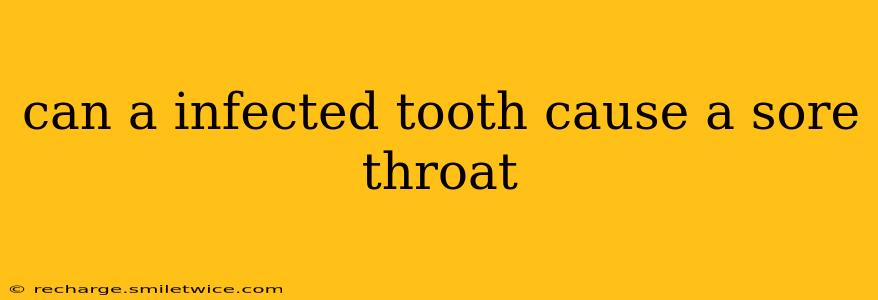A sore throat is an uncomfortable and often painful condition, and while it's commonly associated with viral or bacterial infections in the throat itself, it can sometimes be a symptom of a problem elsewhere in the body. One surprising potential culprit? An infected tooth. While not the most common cause, an infected tooth can indeed contribute to a sore throat, and understanding why is crucial for proper diagnosis and treatment.
How Can a Tooth Infection Lead to a Sore Throat?
The connection between a tooth infection and a sore throat isn't direct in the sense of bacteria migrating directly from the tooth to the throat. Instead, the link is often indirect and involves the body's immune response and the spread of infection through the lymphatic system.
Here's how it works:
-
Infection and Inflammation: A severe tooth infection, such as an abscessed tooth, involves significant inflammation and infection at the site of the tooth root. This can cause swelling and pain in the jaw and surrounding tissues.
-
Lymphatic System Involvement: The lymphatic system, a network of vessels and nodes that helps fight infection, plays a critical role. The lymph nodes in the neck and throat are closely associated with the mouth and jaw. When a tooth infection is present, the body's immune system works to combat the infection, causing the lymph nodes to become swollen and inflamed. This inflammation can lead to referred pain—pain felt in a different area from the source of the problem—in the throat, resulting in a sore throat.
-
Spread of Bacteria: While not the primary mechanism, in severe cases, some bacteria from the infected tooth could potentially spread to nearby areas, including the throat, though this is less common.
What are the Symptoms of a Tooth Infection?
Recognizing the symptoms of a tooth infection is essential for seeking timely treatment and preventing complications, including a secondary sore throat. Common symptoms include:
- Severe toothache: This is often the most prominent symptom, characterized by intense, throbbing pain.
- Sensitivity to temperature: Hot or cold food and drinks may cause significant pain.
- Swelling: Swelling in the gums, cheeks, or jaw is a clear indicator of infection.
- Pus: An abscess may form, resulting in the release of pus.
- Bad breath: A persistent unpleasant odor in the breath can be a sign of infection.
- Fever: A high fever often accompanies severe tooth infections.
Can a Sore Throat Cause Tooth Pain?
While the question we're focusing on is the opposite—can a tooth infection cause a sore throat?—it's important to note that the relationship can sometimes work in the other direction. However, this is much less common. A severe sore throat, especially one caused by strep throat, can sometimes lead to referred pain or discomfort in the jaw and teeth due to the proximity of the throat and jaw muscles. But this usually doesn't cause true tooth pain, which is typically associated with direct problems in the teeth or gums.
How is a Tooth Infection Diagnosed and Treated?
A dentist can diagnose a tooth infection through a visual examination, X-rays, and sometimes additional tests. Treatment typically involves:
- Root canal: This procedure removes the infected pulp from the tooth, cleans the root canals, and seals them to prevent further infection.
- Extraction: In severe cases, the infected tooth may need to be removed.
- Antibiotics: Antibiotics are often prescribed to combat the infection and prevent its spread.
It's crucial to see a dentist immediately if you suspect a tooth infection. Early treatment can prevent complications like a sore throat and other more serious health problems.
When to See a Doctor or Dentist?
If you experience a sore throat accompanied by any symptoms suggestive of a tooth infection, it's essential to consult both a dentist and your primary care physician. The dentist will assess your teeth and gums, while your physician can help rule out other potential causes of your sore throat.
This information is for general knowledge and does not constitute medical advice. Always consult with a healthcare professional for any health concerns or before making any decisions related to your health or treatment.
